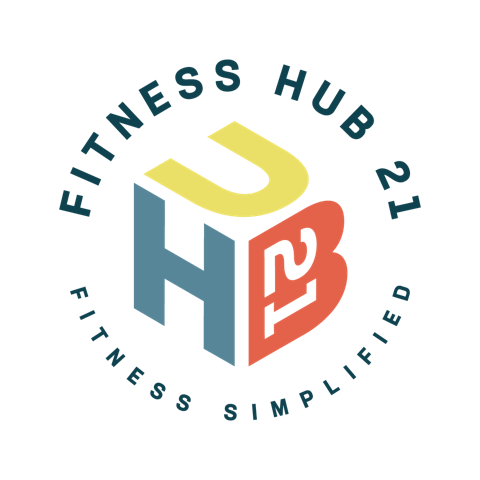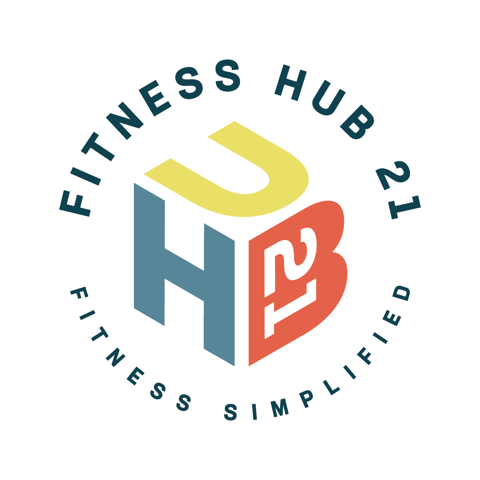

Category: NUTRITION
TIPS FOR MEAL PREP

TIPS / IDEAS ON HOW TO PLAN AND PREP YOUR MEALS AHEAD OF TIME
1. Sit down and work out a 3 day menu of meals you like – that fit within your calories for your weight loss goal. That’s 3 breakfasts, 3 lunches and 3 dinners – or if you enjoy the same breakfast every day just stick to that.
2. Work out in your week the best time for you to cook and prepare your food and stick to the commitment to use that time to prepare your meals.
3. Go shopping and buy according to your above menu/meal plan – get enough for what you will need for the week – if getting to the shop is hard you can always order it online.
4. Make it easy for yourself – Don’t choose to cook complicated meals that take forever, especially if you are time poor. Keep it simple
5. Find a way that works for you – one option in meal prep is to cook extra at dinner time and eat that for lunch the next day. If you don’t have time to cook everyday then do a big cook on Sundays and Wednesdays for example and prep a large batch of food that you can freeze or will stay fresh in the fridge. This is my preferred way to batch my meals as I work late every night and don’t always have the time to do it everyday.
Whatever method you use, find one that suits your lifestyle and preferences.
One you can stick with and is easy to manage long term.
It will lead to greater success, less stress and give you more time to enjoy life
THE IMPORTANCE OF HYDRATION

Hydration
Is vital for our health and training outcomes
Signs of dehydration
Why being hydrated is important
How to stay hydrated
A quick test to check your hydration levels
Health is more than just fat loss, we have to be aware of the signs that things aren’t right and be equipped with the knowledge on how to correct them.
A simple thing like drinking more water can have a massive impact on your health and wellbeing.


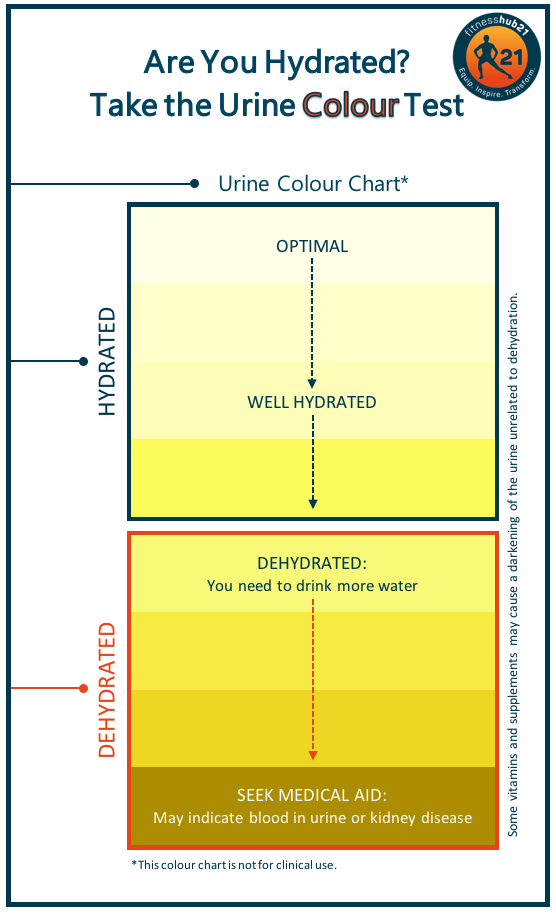
BATCHING YOUR MEALS
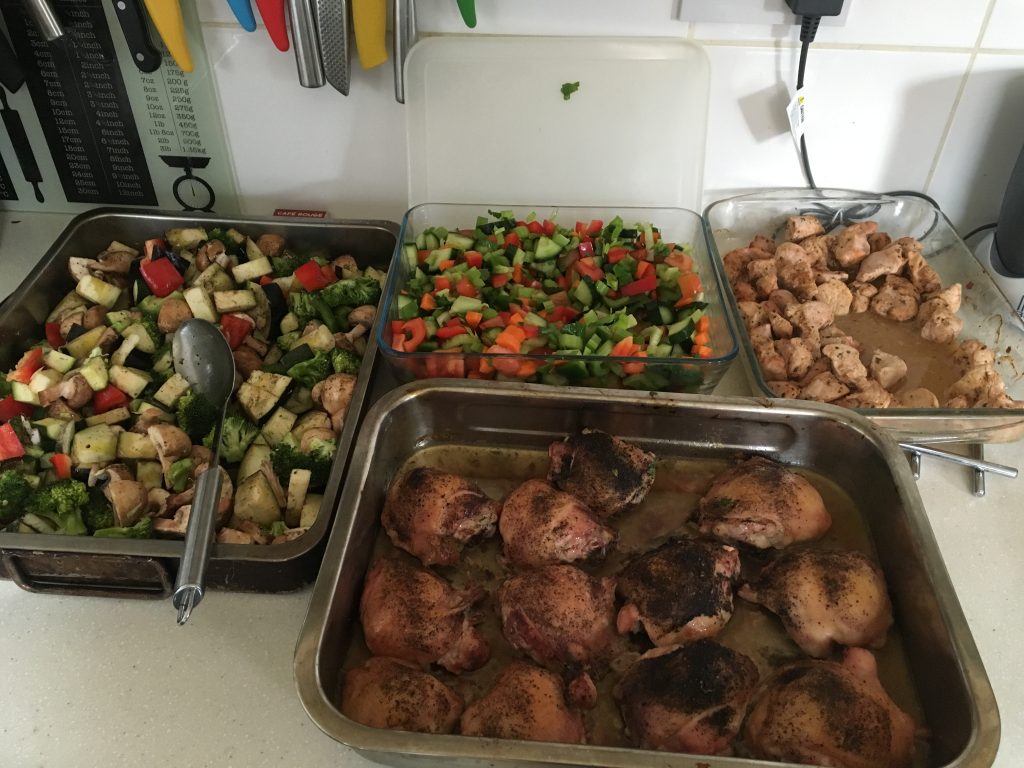
BATCHING YOUR MEALS
Following on from the topic of meal prep and planning ahead; this is just one example of how to get ahead of yourselves with your food prep.
The biggest key to success when planning ahead is making the time within your life to get it done.
This has to fit into your lifestyle and day to day routine.
For me its 2 big cooks a week, I prep a cooked vegetable meal and a raw salad. I rotate the protein I eat to create variety and I use different things to accompany my meals such as hommous, avocado, feta cheese etc to again create variety. The above picture is enough to feed 2 people for 2-3 days at least – any longer and the food doesn’t last. For most of you you won’t need to prep on this scale, but it gives you an idea of how you can batch your meals ahead of time.
This works for me but it may not work for you
This is just one example of how you can make healthy eating and living fit your lifestyle – which will make losing weight or maintaining weight loss that much easier as you have a set structure and routine that you follow day in and day out.
I usually have a container with sticks of carrot, cucumber, peppers and cherry tomatoes in the fridge to snack on when I feel like it between meals. This may stop you from reaching for biscuits or other higher calorie snacks.
I am a big fan of batching my meals ahead of time but if this isn’t for you have a think about how you can make time to be organised with your meals which in turn will make it easier to stick to a healthy regime, making weight loss much easier.
If you need help in this area I am always available for a chat to help you.
HOW TO INCREASE PROTEIN INTAKE
How you can increase your protein intake!
Following on from the slides stating the benefits of protein and the different protein sources, here is a simple way to increase your protein intake if you find you aren’t eating enough for optimal health
Increasing your intake of higher protein foods can lead to you eating less carbs and fats and therefore results in weight loss.
However remember that you need to be balanced and have variety in what you eat.


PROTEIN – what does 25g look like
Today i want to give you a visual on what 25g protein looks like in the real life.
Below is a slide of what 25g protein looks like. If you were aiming for 100g protein a day then this would represent 1/4 of your intake each day.
If you base your protein intake on 1.2-2.2g/kg body weight you can work out how much you need each day.
Last week we went through the benefits of protein, this week it’s what does a meal with 25g protein look like. In your day you may have salmon and eggs at breakfast, chicken salad with feta at lunch and then red meat with rice and vegetables for dinner.
If you are vegan or vegetarian adding a rice or pea protein powder to your day can help increase your protein intake overall. You can also eat quinoa, soy, seeds, nuts and legumes to help boost your protein intake.
If you need help with finding ways to increase your protein, book in for a chat and we can work it out.
This is just a small list of foods containing protein – there are many other foods you can choose from in order to meet your daily requirements.
After adequate calorie intake our protein intake is next in line in importance to fat loss and body composition.
Don’t just increase protein without making other dietary changes, especially if you want to lose weight. A great place to start is to increase your protein but decrease the starchy carbs (rice, bread, pasta etc) you eat and replace them with more vegetables as these are lower in calories, you can also decrease the amount of processed foods you eat and the frequency of very high fat and high sugar foods which constantly tip you over the edge in terms of calories.
Balance is key
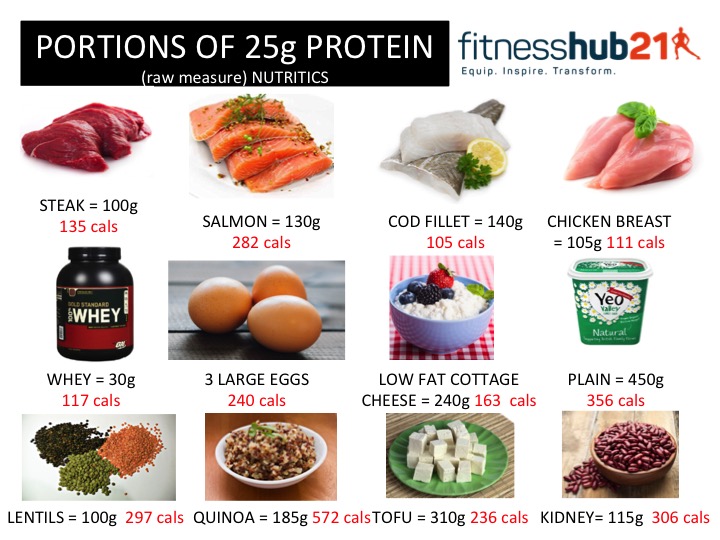
PROTEIN – How much and why it’s important
WHY YOU NEED YOUR PROTEIN
I can’t emphasise enough the importance of eating enough protein in your diet.
Protein is essential for optimal health and making sure your eating enough can also help you lose weight and recover faster from training.
Protein is made up of Amino acids – they have a variety of functions that are essential to us and our health.
Protein consists of Essential amino acids and non essential amino acids. The essential ones can only come from the diet as we can’t make them ourselves.
Protein sources that have all essential amino acids are called complete proteins.
These are usually found in animal products but are also found from vegetable and grain sources
They are important for collagen and elastin, all enzyme function, hormomes, immune function, acid base balance, fluid balance and energy balance
They constitute a large part of muscles, hair, skin, teeth and bones
Below are 2 slides on the benefits of protein and where you can find complete proteins


STRUCTURE GIVES YOU FREEDOM
STRUCTURE GIVES YOU FREEDOM
We are all busy and struggle to find the time to do the things we want or need.
There will be times we need to prioritise our schedule to set us up for the results we want.
We all say we don’t have time to prep food.
We don’t have time to train.
We are just too busy.
In reality if we looked hard enough there are always pockets of time we can free up, that we can use to set us up for victory in the pursuit of weight loss and optimal health.
Our number one healthy habit is plan your meals!!
It’s something that we encourage clients to do on a daily basis as it’s so important in their weight loss journey and in the maintenance of any results achieved long term.
Getting into the practice of planning ahead will reduce your stress levels as you know what your eating, it will give you freedom and you won’t have to worry about going off track as everything is prepared ahead of time.
This will lead to more consistent weight loss and allow you to enjoy the journey more, it will leave you more motivated and in control.
Just lately a few of our members have made the effort to prep their food and plan ahead. The result is less stress for them, following the meal plan set for them and they are losing weight.
Here is what Teresa had to say about planning and prepping meals ahead of time –
“This has been the biggest factor to staying on track with healthy eating throughout the week. I started off by thinking about some foods or meals that I like, then finding some healthy recipes or using some of the suggestions Lisa has posted on the FB page and then spent some time cooking, instead of sitting on the sofa watching tv!
I have prepared soups, vegetable curries & chilli’s and pea fusilli pasta bakes, portioned them up and popped them in the freezer, ready to grab and go during the week.
The real big win for me is not having to spend time each day wondering what to eat, or defaulting to buying sandwiches and crisps on the go.
I grab a soup for lunch time, choose evening meal and all I have to do is ‘heat and eat’!
Planning and prepping has taken away the stress of trying to stay on track and I’ve stopped constantly thinking about food, yay!!
Great results don’t just happen
You need to structure your success by doing the right things daily – planning your meals, finding time to train, getting good sleep etc
HOW TO STOP SABOTAGING YOUR DIET
HOW TO STOP SABOTAGING YOUR DIET
So often I see clients who struggle with their nutrition, and are constantly sabotaging their fat loss efforts without realizing it.
Below I have listed a few things to help you take control and stop getting in your own way in your journey to losing fat long term.
1. Over eating on weekends – So often clients are eating well through the week but completely come undone at weekends.
They go way off track and wonder why they aren’t getting anywhere. I am not saying you cant’ indulge a little but too often will slow down results.
For me I try to eat near perfect Monday to Friday so that I can plan out a few things I like on the weekends.
Always be mindful of your weekend eating and plan out your social activities so they don’t derail you.
2. Skipping meals – So often we think that by skipping a few meals we will eat fewer calories that will lead to greater fat loss.
You don’t have to starve yourself to lose weight. Plan out your meals ahead of time, don’t skip meals and don’t be scared of eating 3-5 times a day if you are following your eating plan properly.
We often think we need to suffer to lose weight, be it in training or by following a ridiculous diet that restricts everything. YOU DON”T
Fat loss should be about health and nutrients and making sure you are getting enough of what you need to function better, have more energy, sleep better, train better and think better.
3. Reward yourself with food after exercising – This is a big one and I see it so often. You cannot out train a bad diet!!!!
Just because you train doesn’t mean you can eat what you want.
We somehow think we are exempt and this can be a big reason why you aren’t getting the results you want.
Like always stick to the eating plan your coach has provided you with, try to get out of this way of thinking so you can finally move forward.
4. You don’t give your eating plan enough time to work – So often a client starts a new eating plan and only sticks to it for 1-2 weeks before declaring it doesn’t work and start making their own changes based on what they think.
I have learnt that you need to be patient and really commit to the plan to test how effective it is for you.
As a coach if my client follows the plan they always see results, and I can make changes as and when they are needed as I know they have the foundations spot on.
Be patient and trust that your coach knows what they are doing (providing they are following evidence based nutritional guidelines).
5. One slip and the whole day is ruined – In terms of self-sabotage this is a big one. You eat some cake mid morning and immediately declare that you ruined the day so proceed in eating whatever you want and declare to start again tomorrow.
If you eat the cake, it’s done, you can’t take it back, but you can control the rest of the day and stay on track.
We need to rid ourselves of the guilt associated with eating something not in the plan and look at the bigger picture.
One piece of cake in a week will not ruin your fat loss results, but constantly losing a day because of one slip will definitely have an impact on your goals.
Try to keep things in perspective, you are only human, you just have to pick yourself up and keep going.
6. You don’t keep track of your food portions – I don’t expect clients to stress over weighing everything but your portion size can play a big role in long-term fat loss.
It’s easy to over eat even if it’s healthy.
To combat this you should weigh or portion your meals, use a bowl instead of a plate, use cup measurements to portion rice and veg, use the palm size of your hand to measure protein etc.
When I was trying to lose fat I switched to a bowl for my main meals as it stopped me over eating. I found this very useful and successful in sticking to my calorie goal and use it to this day.
7. Not reading the label – We are so often tricked into believing something is healthy for us because it is what the front label says.
It could be labeled as low fat, low sugar, low carbs etc. and we immediately think its ok but you have to look a little deeper.
Look at the serving size then times it by how big your portion will be – after this I usually realise it’s not worth it.
Food companies want you to buy their product so make it look as healthy as possible.
If your still not sure – stick to real food, make it yourself and don’t trust what companies say.
8. Trying to do too much at once – When starting out on your fat loss journey so many people try to do everything at once – food prep, training, lifestyle changes etc.
Unless you are one of the few who can make a lot of changes without much of a challenge – you will soon become overwhelmed and feel like you are failing and not good enough.
What I do with clients is set weekly goals; we sit down and chat about where they are at in their journey, work out how stressed they are, how much time they have for training and food prep etc.
Then I work out what 1-2 big changes they need to make first before overloading them with a long list.
You need to prioritise what you need to do first to get you started on your journey, then as you build better habits you can make more changes.
If you currently feel overwhelmed – sit down and work out what big changes need to happen first.
If getting to the gym is too hard and you are not exercising – aim for 10000 steps a day.
If you are bored of the gym – go find a personal trainer or local boot camp.
If you can’t get your eating right – cut out sugar and lower your white starches down and eat more vegetable.
Make 1-2 changes that make the biggest difference in helping you reach your goals.
9. Letting the scales be your guide – to be honest I don’t really weigh myself, as it always leads to misery.
Constantly jumping on the scales every day can turn your fat loss goal into an emotional rollercoaster.
You might feel great until you jump on the scales and your disappointed, which in turn ruins your day, it effects your food choices and you don’t even feel like training anymore.
Don’t weigh yourself too often – once a week maximum.
I use girth measurements with clients over weight, and even then it’s not always accurate.
Forget the scales, stick to eating plan, train your butt off, stay positive, be consistent and you will drop fat – trust me
10. You are too hard on yourself – No one is perfect and there is no perfect diet, perfect training program, or perfect plan for fat loss.
Your journey is just that…. it’s a journey, it will be filled with highs and lows, good choices and bad choices, great training sessions and poor training sessions, good days and bad days.
Don’t be so hard on yourself when you mess up…………………
IT HAPPENS.
You just have to learn from it and move on. Don’t worry about being perfect; but instead focus on doing your best each day, be consistent and enjoy the journey.
Stress less and enjoy life, stay positive
WHAT DIET IS BEST??
WHICH DIET SHOULD YOU CHOOSE?
Every week there is a new wonder diet that claims to make weight loss easy and faster. There is so much information out there it can become confusing whom to believe.
An article that compared popular diet programs in overweight and obese individuals found that people lost weight following both low carb and low fat diets as well those on zone diet. They concluded that the best diet is the one that you can stick to for the longest.
The ideal diet is one that is best adhered to by you, so that you can stay on the diet as long as possible to get the best results
Because low carb worked for your friend doesn’t mean it’s the diet for you.
Its not the low carb that makes you lose weight – it’s the fact that you are eating less than what you burn, therefore you lose weight. The same rule applies for low fat, intermittent fasting etc
Having competed in physique comps for 5 years I have been on my fair share of diets. I have achieved my results eating low carb, high carb, medium carb, low fat, higher fat etc.
The one thing that remained constant throughout was calorie deficit and hitting my protein goal each day as well as training 3-4 x a week consistently – week in, week out, month in, month out, one day at a time. I had to find a way of eating that suited my lifestyle, working hours and food preferences in order that I may stick to it long enough to see it work.
There are no wonder diets; you cannot replace hard work, consistency and time when it comes to achieving your goal. The bigger the goal the greater the effort required to achieve it and the bigger the sacrifice.
